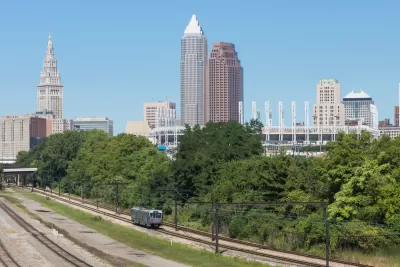The Greater Cleveland Regional Transit Authority is partnering with local governments and nonprofits to create new transit options for the thousands of workers flocking to the region’s new job centers.

As small towns in northeastern Ohio grow and gain major employment centers that require transportation for growing numbers of workers, “local nonprofits and transit agencies are trying their hand at developing smaller, individual solutions to solve this big problem.”
As Conor Morris reports for WKSU, “The GCRTA [Greater Cleveland Regional Transit Authority] recently redesigned its services to try to improve riders’ connections to work, but there’s only so much that traditional fixed routes can do to get people to every single job center out there. Because of that, Maribeth Feke, director of programming and planning for GCRTA, said her agency is piloting a new ‘micro mobility’ program called ConnectWorkS that could serve as a model for future efforts to get people to jobs at industrial centers through public transit.”
ConnectWorkS has two major components. The first is a “partnership with the village of Mayfield and the city of Highland Heights to provide a new bus route that connects the end of the #7A RTA bus line to a new bus loop” and will serve an estimated 12,000 workers. “The other part of the ConnectWorkS pilot involves the GCRTA working with SHARE Mobility, a rideshare service, to provide workers in the Bedford Heights and Solon area with a quick connection to their jobs once they get off public transit.”
According to Morris, “While ConnectWorkS is just getting off the ground, Feke said she was excited about its potential. Between the two pilots, the GCRTA will be hitting ‘a third of the high job centers’ in the county. She said the point is to address what some advocates call the first- or last-mile issue, where workers can get close to work through public transit, but still face a long walk after they get off the bus or train.”
FULL STORY: How Northeast Ohio communities are building small transit solutions to solve big issue of sprawl

Alabama: Trump Terminates Settlements for Black Communities Harmed By Raw Sewage
Trump deemed the landmark civil rights agreement “illegal DEI and environmental justice policy.”

Planetizen Federal Action Tracker
A weekly monitor of how Trump’s orders and actions are impacting planners and planning in America.

The 120 Year Old Tiny Home Villages That Sheltered San Francisco’s Earthquake Refugees
More than a century ago, San Francisco mobilized to house thousands of residents displaced by the 1906 earthquake. Could their strategy offer a model for the present?

In Both Crashes and Crime, Public Transportation is Far Safer than Driving
Contrary to popular assumptions, public transportation has far lower crash and crime rates than automobile travel. For safer communities, improve and encourage transit travel.

Report: Zoning Reforms Should Complement Nashville’s Ambitious Transit Plan
Without reform, restrictive zoning codes will limit the impact of the city’s planned transit expansion and could exclude some of the residents who depend on transit the most.

Judge Orders Release of Frozen IRA, IIJA Funding
The decision is a victory for environmental groups who charged that freezing funds for critical infrastructure and disaster response programs caused “real and irreparable harm” to communities.
Urban Design for Planners 1: Software Tools
This six-course series explores essential urban design concepts using open source software and equips planners with the tools they need to participate fully in the urban design process.
Planning for Universal Design
Learn the tools for implementing Universal Design in planning regulations.
Clanton & Associates, Inc.
Jessamine County Fiscal Court
Institute for Housing and Urban Development Studies (IHS)
City of Grandview
Harvard GSD Executive Education
Toledo-Lucas County Plan Commissions
Salt Lake City
NYU Wagner Graduate School of Public Service





























